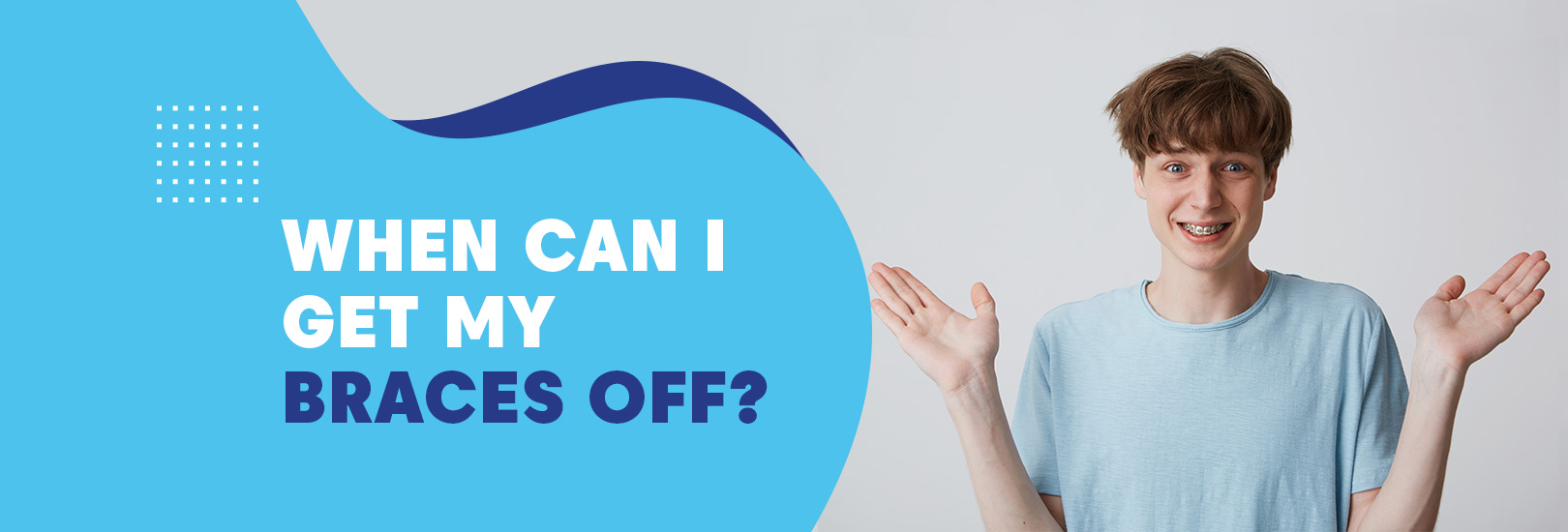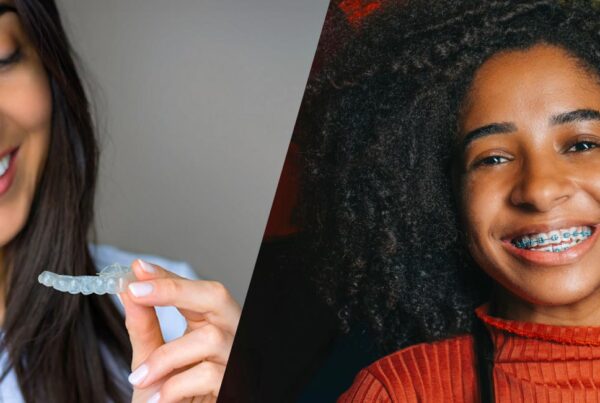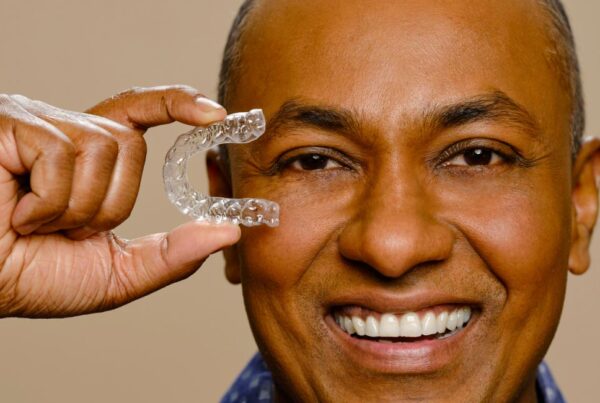- Can I Get My Braces Off Early?
- What Happens If You Take Your Braces Off Early?
- Factors Affecting Braces Removal
- Signs Your Braces Are Coming Off Soon
- Does Getting Braces Off Hurt?
- How To Get Braces Off Faster
- The Removal Process: How Long Does It Take To Get Your Braces Off?
- Average Timing For Braces Removal
- Average Age To Get Braces Off
- After Braces Removal
- Post-Braces Diet And Care
- Experience Stress-Free Braces Removal With Orthodontic Experts
- FAQs
Are you eagerly counting down the days until you can finally wave goodbye to braces? The anticipation of getting your braces off is an exciting milestone in your orthodontic journey. But when exactly can you expect to shed those metal wires and brackets and reveal your straight, beautiful smile?
While the average age and timing for braces removal can serve as a general guideline, it’s important to remember that each case is unique. Your orthodontist will personalize your treatment plan and timeline to best suit your needs. So, if you’ve been wondering, “When can I get my braces off?” stick around as we unravel all the answers and guide you through the journey to brace-free bliss.
Can I Get My Braces Off Early?

The timeline for braces removal primarily depends on each individual’s unique orthodontic needs and treatment plan. In some cases, patients may be eligible for early braces removal. However, it’s important to note that this decision should be made by an experienced orthodontist. At Orthodontic Experts, our skilled team will carefully evaluate whether early removal is suitable in your case.
What Happens If You Take Your Braces Off Early?
Braces should only be removed when the teeth have settled into their new position. If this is not done correctly, there are many potential complications that can arise including: – Teeth returning to their initial misaligned positions – Increased risk of tooth decay and gum disease – Increased cost for future treatment In short, if you follow your doctor’s instructions carefully, you will likely see a more rapid smile progression than expected. Our team here at our clinic will provide all the information you need to get the most out of your braces experience.
Factors Affecting Braces Removal

When it comes to taking off braces, several factors come into play. Understanding these factors can help you get a clearer idea of when you can expect to have your braces removed. Here are the key factors that determine the timing of braces removal:
1. Treatment Goals:
Each orthodontic treatment plan is designed with specific goals in mind. The complexity of your dental issues and how well your teeth respond to treatment will influence the duration of wearing braces. Your orthodontist will evaluate your progress and determine when it’s appropriate to remove your braces.
2. Age:
Age is another factor that can affect the timing of braces removal. For children and teenagers, orthodontic treatment may involve guiding the growth of the jaws, which can take longer. Adults may have their braces removed sooner since their jaws have already stopped growing.
3. Severity of Issues:
The severity of your dental issues plays a significant role in the duration of braces treatment. If you have complex orthodontic problems, such as significant teeth crowding or a misaligned bite, it may take longer to achieve the desired results.
4. Individual Response to Treatment:
Every person’s body responds differently to orthodontic treatment. Some individuals may experience faster tooth movement and alignment, while others may require more time. Your orthodontist will closely monitor your progress during regular appointments and adjust the treatment plan accordingly.
Signs Your Braces Are Coming Off Soon

We understand the excitement and anticipation that comes with the prospect of braces removal. That’s why we’ve put together a comprehensive list of signs to help you determine if your braces might be coming off soon. So, let’s dive in and discover the observable signs that indicate the nearing end of your braces journey:
1. Straightened Teeth:
One of the most obvious signs that your braces are coming off soon is the noticeable improvement in the alignment of your teeth. As your orthodontic treatment progresses, your teeth will gradually straighten, and you’ll start to see the desired outcome taking shape.
2. Gaps Closing:
If you had gaps between your teeth before getting braces, you’ll notice those gaps starting to close as your treatment progresses. The narrowing of spaces between your teeth is a positive indication that you’re nearing the end of your braces journey.
3. Bite Alignment:
Another notable sign that your braces might be coming off soon is when your bite starts to align properly. If you had an overbite, underbite, or crossbite, you’ll notice significant improvements in how your upper and lower teeth fit together.
4. Reduced Discomfort:
Throughout your orthodontic treatment, you may have experienced some discomfort due to the pressure and adjustments made to your braces. As your teeth become better aligned, you’ll likely notice a decrease in discomfort, indicating that your treatment is coming to an end.
5. Progress Evaluation:
Regular progress evaluations by your orthodontist are a crucial part of your braces journey. If your orthodontist starts mentioning that your treatment is progressing well and that you’re nearing the end, it’s a good sign that your braces removal might be just around the corner.
Does Getting Braces Off Hurt?
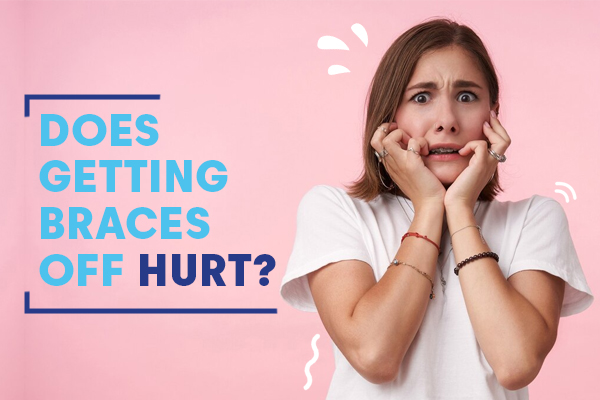
One of the common concerns many people have when approaching the braces removal process is whether their teeth will hurt after braces come off. However, it’s important to note that getting braces off is typically a painless procedure. Let’s delve into the details and address any potential discomfort or sensations that might occur.
The Procedure of Braces Removal
During the braces removal process, your orthodontist will carefully and gently remove the brackets and wires from your teeth. This procedure is usually straightforward and pain-free. They will use special tools to carefully detach the brackets and then remove any remaining bonding material on your teeth. This step ensures that all traces of braces are eliminated, allowing you to enjoy your new smile without any visible remnants.
Tips to Manage Minimal Discomfort
While the overall process is painless, it’s not uncommon to experience some minimal discomfort or sensations during braces removal. This can vary from person to person due to individual sensitivity levels. Here are some tips to help manage any potential discomfort:
1. Massage your gums: After the braces are removed, you may experience some tenderness or soreness in your gums. Gently massaging your gums with clean fingers can help alleviate any discomfort.
2. Rinse with saltwater: Swishing a warm saltwater solution in your mouth can provide relief and promote healing if you experience gum or mouth soreness.
3. Use over-the-counter pain relievers: If you do experience any mild discomfort, over-the-counter pain relievers such as ibuprofen can help alleviate it. However, it’s always best to consult with your orthodontist or healthcare professional before taking any medication.
How to Get Braces Off Faster
While the duration of orthodontic treatment is determined by various factors, there are some things you can do to potentially speed up the process. Here are a few tips:
- Maintain excellent oral hygiene: Regularly brushing and flossing your teeth, as well as keeping your braces clean, will help prevent any delays in treatment caused by issues such as tooth decay or gum inflammation.
- Follow your orthodontist’s instructions: Be diligent about wearing rubber bands, headgear, or any additional appliances as directed. Compliance with your orthodontist’s instructions and advice is crucial for optimal treatment progress.
- Attend scheduled appointments: Regularly visiting your orthodontist for adjustments is important, as they will make necessary modifications to keep your treatment on track.
The Removal Process: How Long Does It Take to Get Your Braces Off?

The average time it takes to remove braces, clean teeth and fit a retainer ranges from 1-2 hours on average. The first step is for your orthodontist to use special equipment to pop the braces off. They will then clean any leftover adhesive as well as any food or plaque that may have been trapped beneath them. Next, they will take digital scans or photos of your teeth in order to create a fitting retainer. This measurement will help keep your teeth properly aligned once you’ve completed treatment with braces.
Average Timing for Braces Removal
The timing for braces removal is determined by the treatment plan designed by your orthodontist. The gradual movement of teeth to their desired positions takes time, and premature removal can lengthen the overall treatment duration. Typically, individuals who have undergone treatment with Traditional Metal Braces will generally wear them for a duration of 18 to 24 months. Yet, in cases that are more intricate, an extended period might be necessary to achieve the best possible outcomes. Your orthodontist will carefully monitor your progress and determine the appropriate time for removal. Regular visits will ensure that your teeth are moving in the right direction and that any necessary adjustments can be made.
Average Age to Get Braces Off
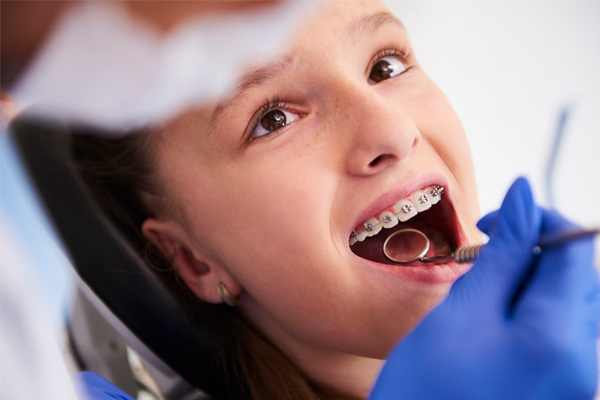
Teens:
Adolescence is a common time for braces. With all adult teeth in place and a flexible jaw, teens often require the shortest treatment duration.
Kids:
As per the American Association of Orthodontics, children should have their first orthodontic checkup around age seven. Early visits help our orthodontists to assess the need for two-phase treatment, which spans a longer duration but guarantees valuable results.
Adults:
If you’re 18 or older, your treatment duration might exceed the norm. The more permanent nature of adult jaws demands extra effort to achieve alignment.
After Braces Removal
Once your braces have been removed, you may experience a mix of emotions excitement, relief, and a bit of adjustment. It’s important to understand what to expect during the initial period following braces removal to ensure the longevity of your newly achieved alignment. Here are some key considerations to keep in mind:
- Retainer Wear: Following braces removal, it is essential to wear your retainers as directed by your orthodontist. Retainers help maintain the new position of your teeth and prevent them from shifting back to their original misalignment. Your orthodontist will provide specific instructions on when and how long to wear your retainers.
- Adjustment Period: It is normal to feel a slight awkwardness or discomfort in the first few days after braces removal. Your teeth may feel slightly sensitive, and your bite may need time to settle. This adjustment period varies from person to person but typically resolves within a few days.
- Oral Hygiene: Maintaining good oral hygiene is crucial for healthy teeth and gums. After braces removal, continue practicing thorough brushing and flossing techniques to keep your teeth clean and free from any residual adhesive. Regular dental check-ups and cleanings should be part of your oral care routine to ensure long-term oral health.
- Long-Term Maintenance: While braces have successfully aligned your teeth, it is important to realize that teeth can naturally shift over time. Consistently follow your orthodontist’s recommendations, including wearing retainers as prescribed, to maintain the results achieved through the orthodontic treatment.
- Diet Modifications: After having your braces removed, you may gradually reintroduce a wider variety of foods into your diet. However, it is recommended to stick to softer, non-sticky food options initially. Avoiding excessively hard or crunchy foods for the first few days can minimize discomfort and protect your teeth from any potential damage.
- Sensitivity: It is not uncommon to experience some sensitivity in your teeth after braces removal. This sensitivity should be temporary and will typically subside on its own over time. If needed, over-the-counter pain relievers can help manage any discomfort or sensitivity.
Post-Braces Diet and Care
By following these post-braces care guidelines and incorporating gentle foods into your diet, you’ll be on your way to maintaining a healthy smile for years to come. Remember that each individual’s post-braces experience may vary, so it’s crucial to consult with your orthodontist for personalized advice.
Diet

1. Soft Foods: Opt for soft and easy-to-chew foods such as mashed potatoes, yogurt, scrambled eggs, smoothies, and soups. These foods are gentle on your teeth and won’t require excessive chewing, which can help alleviate any temporary soreness.
2. Cooked Vegetables: Steamed or boiled vegetables, like carrots or broccoli, provide essential nutrients without straining your teeth. You can also try pureeing them into a tasty, easily digestible soup.
3. Lean Protein: Incorporate soft proteins into your diet, such as fish, ground meat, or tofu. These options are not only gentle on your teeth but also provide the necessary nutrients for a balanced diet.
4. Cut Fruits: While fruits are incredibly important for a healthy diet, it’s best to avoid hard fruits like apples or pears immediately after getting your braces removed. Instead, opt for softer fruits like bananas, melons, or berries, which can be cut into bite-sized pieces.
Oral Hygiene
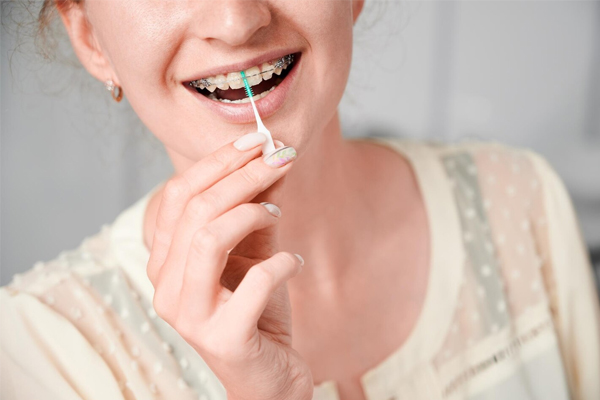
1. Brushing: Brush your teeth thoroughly at least twice a day for two minutes using a soft-bristled toothbrush. Be gentle and make sure to clean all surfaces of your teeth, including the gumline. Don’t forget to replace your toothbrush every three to four months or when the bristles become frayed.
2. Flossing: Flossing is essential for removing plaque and food particles that can get trapped between your teeth. Use a floss threader or a water flosser if needed to navigate around any retainers or dental appliances.
3. Mouthwash: Rinse your mouth with an alcohol-free mouthwash after brushing and flossing to freshen your breath and kill bacteria. Look for mouthwashes with fluoride to strengthen your teeth.
4. Regular Dental Check-ups: Schedule regular dental check-ups with your orthodontist or dentist to monitor your oral health, ensure everything is progressing as it should, and address any concerns or issues that may arise.
Experience Stress-Free Braces Removal With Orthodontic Experts
In the journey toward a radiant smile, the question of when braces can be removed is a common curiosity. Whether you’re a teen eager to showcase your newfound confidence, a child embarking on the path to dental wellness, or an adult seeking alignment perfection, the timing of braces removal is an individualized process. At Orthodontic Experts, we understand the significance of this moment. Our team of experienced professionals stands ready to guide you through this transformative journey, offering personalized timelines and unwavering support. Your smile’s journey is unique, and with our expertise, we ensure that each milestone is met with the utmost care and precision. Reach out to Orthodontic Experts today to embark on the road to your dazzling, confident smile.
FAQs
Does it hurt to get braces off?
The braces removal process itself is painless. Your orthodontist will carefully remove each bracket by gently squeezing and twisting them off. However, you might experience slight pressure or discomfort during the process, particularly when the adhesive is being removed and the brackets are detached. Rest assured, any discomfort is temporary and tolerable.
How quickly do teeth move after braces come off?
Once your braces are removed, your teeth may experience some shifting. This is normal, as your teeth need time to stabilize in their new positions. Your orthodontist will provide a retainer to ensure that your teeth maintain their alignment during this stabilization period.
What is the average age to get braces off?
There is no specific age to get braces off, as it largely depends on individual orthodontic needs. Orthodontic treatment can be undertaken by people of all ages, with the primary focus being achieving a healthy and straight smile.
What should I eat after getting braces off?
After your braces are removed, you may experience some sensitivity or discomfort. It is recommended to stick to soft foods for the first few days, gradually reintroducing harder and stickier foods as your teeth adjust. Avoid hard candies, popcorn, nuts, and any other foods that could damage your teeth or get stuck in between them.


